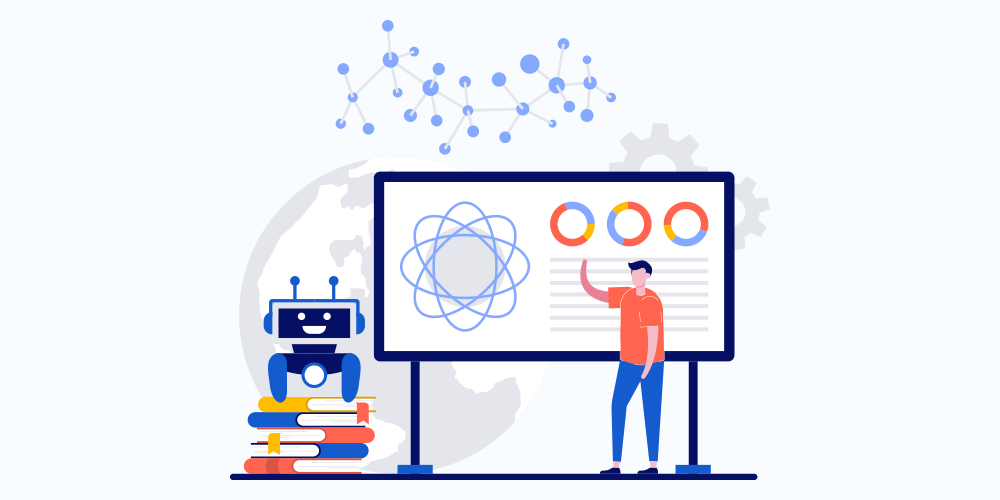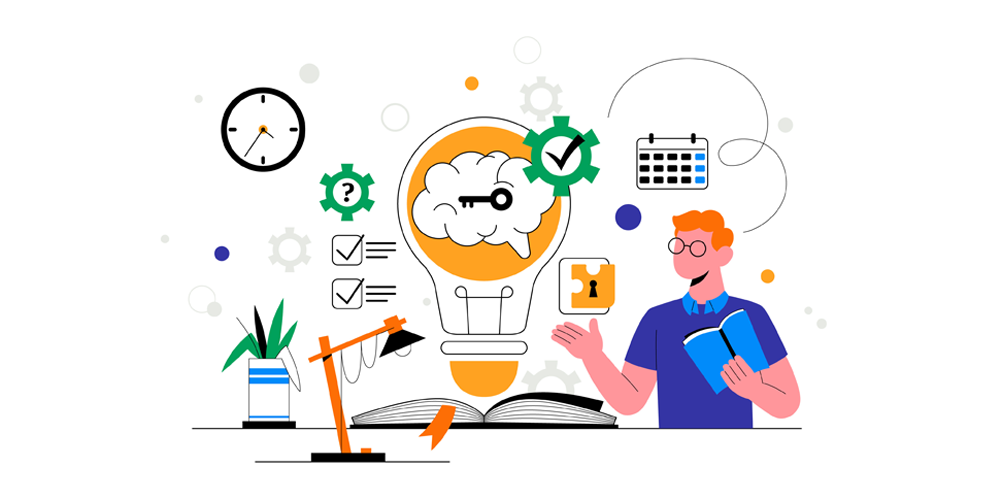How AI Will Displace Teachers: What We Can Expect in the Future
- admin
- 2023-05-04
- 13 min read

As artificial intelligence (AI) continues to evolve, its impact on education is becoming increasingly profound. From AI-driven learning platforms to automated administrative tasks and personalized learning experiences, there is little doubt that AI will continue to transform the way we teach and learn. In this article, we will explore the state of AI in education , its potential, and the challenges it poses for the future of the teaching profession.
Contents
The Current State of AI in Education
Artificial Intelligence (AI) is transforming the education sector by providing customized learning experiences and streamlining administrative tasks. AI is a technology that enables machines to learn from data, identify patterns, and make decisions without human intervention. In the education sector, AI is being used to create innovative solutions that enhance the learning experience for students and teachers alike.
Currently, AI is primarily used in education to provide personalized learning experiences and to automate administrative tasks. AI-driven learning platforms such as Carnegie Learning and DreamBox Learning use machine learning algorithms to personalize educational content based on student performance data. They also use natural language processing to provide automated feedback and guidance to students, reducing the workload of teachers and allowing them to focus on more high-level tasks.
AI is also being used to automate administrative tasks such as student record-keeping and scheduling. This frees up more time for teachers to plan lessons and focus on student engagement . With the help of AI, teachers can now spend more time interacting with students and less time on paperwork.
AI-driven Learning Platforms
AI-driven learning platforms are revolutionizing the way students learn. These platforms use machine learning algorithms to analyze student performance data and provide personalized educational content. They can identify knowledge gaps and customize content to suit each student’s learning style and pace. This ensures that students receive the education they need to succeed.
Moreover, these platforms can give teachers insights into each student’s progress, strengths, and weaknesses, helping to identify areas where students might need additional support. AI-driven learning platforms can also provide students with a variety of learning resources and activities that are tailored to their individual needs, interests, and abilities. This can help to foster a love of learning and encourage students to take ownership of their education.
Personalized Learning Experiences
Personalized learning experiences are another major advantage of AI in education. With AI-driven learning platforms, students are no longer forced to learn at the same pace as their peers. Instead, they can learn at their own pace and in their own way. This not only enhances learning outcomes but also increases student engagement and motivation.
Also Read, Reasons Students should start Engaging in Distance Learning .
Personalized learning experiences can also provide students with more opportunities to explore their interests and to access resources that are tailored to their individual needs. This can help to push students to achieve their full potential. With AI, students can receive a customized education that meets their unique needs and helps them to succeed in their academic and professional careers.
AI in Grading and Assessment
AI is also being used to grade and assess student work. This can free up time for teachers and reduce the risk of bias in grading. AI algorithms can analyze student responses to assignments and provide immediate feedback to both students and teachers. This can be especially useful in identifying areas where students might struggle and need additional support.
AI can also help to identify patterns in student performance and provide insights into the effectiveness of teaching strategies. This can help teachers to refine their teaching methods and provide more effective support to their students. With the help of AI, teachers can provide more accurate and timely feedback to their students, helping them to improve their academic performance.
The Potential of AI in Teaching
While AI is already being used to enhance education in many ways, its full potential for teaching is only beginning to be explored. Here are just a few of the ways that AI can benefit the online school teachers in their profession:
Automating Administrative Tasks
AI can automate many of the administrative tasks that teachers currently perform, freeing up more time for lesson planning and student engagement. This can help to reduce teacher burnout, which is a significant issue in many school systems.
Imagine a world where teachers no longer have to spend hours grading papers, entering grades into spreadsheets, or managing attendance records. AI can take over these tasks, allowing teachers to focus on what they do best: teaching. With more time to plan engaging lessons and interact with students, teachers can create a more dynamic and effective learning experience for everyone.
Enhancing Student Engagement
AI can help teachers to identify and address learning gaps that students might be struggling with. This can help to increase student engagement and motivation, leading to better learning outcomes.
By analyzing student data, AI can provide teachers with insights into how individual students are progressing and where they might be struggling. This can allow teachers to personalize their instruction and provide targeted support to help students succeed . For example, if a student is struggling with a particular concept, AI can suggest additional resources or activities to help reinforce that concept.
Additionally, AI can help to create more engaging learning experiences for students. For example, AI-powered chatbots can provide students with immediate feedback and support, helping them to stay motivated and engaged with their coursework.
Identifying and Addressing Learning Gaps
AI can help teachers to identify and address learning gaps that students might be struggling with. This can help to increase student engagement and motivation, leading to better learning outcomes.
One of the biggest challenges that teachers face is identifying when students are struggling with a particular concept. With large class sizes and limited time, it can be difficult to provide individualized support to every student. However, AI can help to bridge this gap by analyzing student data and identifying patterns of misunderstanding or confusion.
Also Read, Bridging the gap between students .
For example, if a large number of students are consistently answering a particular question incorrectly on an assessment, AI can flag this as a potential learning gap. The teacher can then review the question and provide additional instruction or resources to help students better understand the concept.
Overall, AI has the potential to revolutionize the field of education by providing teachers with powerful tools to enhance their instruction and improve student outcomes. While there are certainly challenges to be addressed, the benefits of AI in teaching are clear.
The Displacement of Teachers by AI
The potential of AI in education is exciting, but it also poses significant challenges for the future of the teaching profession. Here are some of the ways that AI is likely to displace teachers in the coming years:
The Changing Role of Teachers
As AI becomes more advanced, the role of teachers is likely to shift. Teachers will become more focused on high-level tasks such as lesson planning and student engagement, while AI systems handle administrative and grading tasks.
For example, AI can be used to grade multiple-choice tests and assignments, freeing up teachers to focus on providing personalized feedback to students. Additionally, AI can analyze student data to identify areas where students are struggling and provide targeted interventions to help them succeed.
However, it’s important to note that AI is not a replacement for human teachers. The role of teachers in providing emotional support and guidance to students cannot be replicated by machines.
Job Loss and Retraining Opportunities
AI is likely to lead to job loss in the teaching profession, as administrative and grading tasks become automated. However, it will also create new opportunities for teachers who are able to adapt to the changing landscape of education.
Also Read, How is Technology Changing Education ?
For example, teachers who are skilled in the use of AI will be in high demand. They will be able to use AI to create personalized learning experiences for students, analyze data to improve teaching strategies, and develop new educational technologies.
Also Read, The Pros and Cons of Using Education Technology .
Additionally, there will be a need for teachers to help students navigate the ethical implications of AI in education. Teachers can help students understand the potential biases in AI algorithms and teach them how to use AI tools responsibly.
The Ethical Implications of AI in Education
AI in education raises a number of ethical concerns, such as data privacy and bias in grading. These issues will need to be addressed as AI becomes more central to the teaching profession.
For example, AI algorithms can perpetuate biases if they are trained on biased data. This can lead to unfair grading practices and reinforce existing inequalities in education. It’s important for teachers and developers to be aware of these issues and work to address them.
Additionally, the use of AI in education raises questions about data privacy. Student data must be protected and used responsibly to ensure that students are not unfairly targeted or discriminated against based on their personal information.
Overall, the use of AI in education has the potential to transform the teaching profession and improve student outcomes. However, it’s important to approach this technology with caution and ensure that it is used in an ethical and responsible manner.
Preparing for the AI-driven Future of Education
As the use of AI becomes more widespread in education, it is important that teachers, administrators, and policymakers prepare for the changes that lie ahead. Here are some of the ways to do so:
Embracing Technology in the Classroom
With the rapid advancement of technology, it is imperative that teachers embrace technology in the classroom. This includes using AI-driven learning platforms and other educational tools to enhance the learning experience of students. Technology can help students learn at their own pace and provide personalized feedback to improve their understanding of the subject matter.
For instance, AI-powered chatbots can be used to answer students’ questions and provide them with additional resources. These chatbots can be programmed to provide instant and accurate responses to students’ queries, thereby reducing the workload of teachers and allowing them to focus on other aspects of teaching.
Developing New Skills for Educators
As the use of AI becomes more widespread in education, teachers must develop new skills to succeed in the AI-driven future of education . This includes skills such as coding, data analysis, and machine learning, among others.
By learning to code , teachers can create their own educational software and applications, which can be tailored to the specific needs of their students. They can also use data analysis tools to track students’ progress and identify areas where they need additional support.
Moreover, machine learning can be used to personalize the learning experience of students. Teachers can use machine learning algorithms to analyze students’ learning patterns and preferences, and provide them with tailored learning materials that suit their individual needs.
Fostering Collaboration between AI and Teachers
For AI to be effective in education, it must work in collaboration with teachers. Teachers must be able to provide feedback and input to AI systems and work with them to create personalized learning experiences for their students.
AI can help teachers to identify areas where students are struggling and provide them with additional support. For instance, AI-powered tutoring systems can be used to provide students with personalized feedback and guidance on their homework assignments .
Furthermore, AI can help teachers to create more engaging and interactive learning experiences for their students. For example, virtual reality and augmented reality technologies can be used to create immersive learning environments that allow students to explore and interact with the subject matter in a more meaningful way.
In conclusion, preparing for the AI-driven future of education requires a collaborative effort between teachers, administrators, and policymakers. By embracing technology, developing new skills, and fostering collaboration between AI and teachers, we can create a more personalized and effective learning experience for students.
The Limitations of AI in Education
While AI has the potential to transform education, it also has its limitations. Here are some of the challenges that must be addressed:
The Importance of Human Interaction
Despite the many benefits of AI in education, it cannot replace the importance of human interaction. Students need social interactions in order to develop important life skills and to form meaningful connections with others.
For example, when students interact with their peers and teachers, they learn how to communicate effectively, resolve conflicts, and collaborate on projects. These skills are essential for success in the workplace and in life.
Moreover, human interaction can provide emotional support and motivation to students. Teachers can offer encouragement and guidance to students, which can help them overcome challenges and achieve their goals.
Addressing Data Privacy Concerns
As with any technology, there are concerns around data privacy and the potential misuse of student data. Policies must be put in place to ensure that student data is protected and that it is used only for educational purposes.
Furthermore, it is important to educate students about data privacy and how their personal information is being used. This can help them understand the risks and benefits of using AI in education.
One way to address data privacy concerns is to use decentralized systems that give students more control over their data. For example, blockchain technology can be used to create a secure and transparent system for storing and sharing student data.
Ensuring Equitable Access to AI-driven Education
As AI becomes more central to education, it is important to ensure that all students have equitable access to these tools. This includes students from disadvantaged backgrounds, who may not have access to the technology or the resources necessary to benefit from AI-driven education.
One way to address this issue is to provide funding for schools in low-income areas to purchase AI technology and hire trained professionals to implement and maintain it. Additionally, partnerships between schools and technology companies can help to provide access to AI-driven education for all students.
Moreover, it is important to ensure that AI-driven education is culturally responsive and inclusive. This means that the technology should be designed to meet the needs of diverse learners, including those with disabilities and those who speak languages other than English.
Also Read about the importance of English grammar .
In conclusion, while AI has the potential to transform education, it is important to address the limitations and challenges that come with it. By doing so, we can ensure that AI-driven education is effective, equitable, and inclusive for all students.
Conclusion: Balancing AI and Human Teaching for the Future
As AI continues to advance, it is clear that it will play an increasingly important role in education. However, it is important to remember that AI cannot replace the human connection that is critical to effective teaching and learning. Instead, we must find a balance between AI and human teaching, leveraging the power of technology to enhance education while also ensuring that students receive personalized attention and support
from their teachers.
21K School
Read our latest education blogs here. We are pioneers in proffering personalised, affordable and high-quality lessons using an advanced learning platform.


Join Asia’s Leading Online School and Unlock
endless opportunities
Join Asia’s
Leading Online School
and Unlock endless opportunities

 Thailand
Thailand





